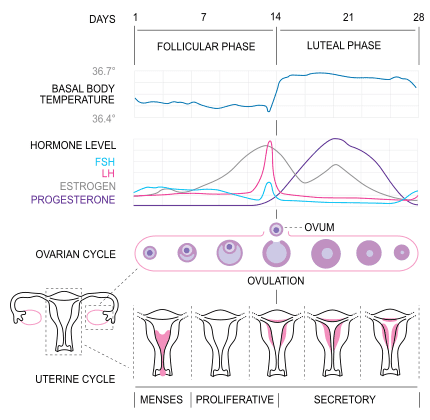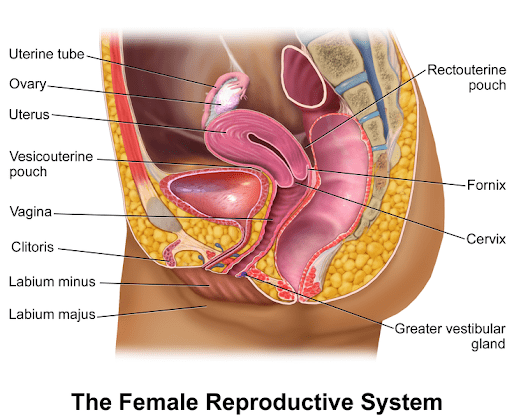6 Top Fertility Facts You May Not Know
A popular medical survey revealed that 1 of 12,000+ women correctly answered 15 questions their reproductive systems. These surprising results show how crucial it is to learn fertility facts.

If you’re curious about ovulation and conception, you are not alone. Women of all ages and stages have similar concerns, and they are covered below. Read on to learn the top six fertility facts you may not know (and check out our list of ovary facts here).
1. Your most fertile time lasts only two to three days per cycle.

You can get pregnant any day of your fertile window. It’s most likely to happen 24 to 36 hours out of six days. This small window may be surprising, and that’s common.
Your fertile window is six days long because male sperm live for up to five days. Your body produces luteinizing hormone right before ovulation.
You’re most likely to get pregnant during your LH surge plus the day of ovulation. Here’s a look at a standard fertile window:
- 1st through 3rd day– No hormonal surge, but sperm can survive until ovulation.
- 4th through 5th day – LH surge occurs for 24 to 48 hours.
- 6th day – Day of ovulation and possible conception.
This seems pretty simple, but there’s more to it. The next fertility fact provides more insight into fertile windows.
2. Your fertile window can change every month.
Ovulation and menstrual cycles aren’t set in stone. One popular study showed that only 30% of women had consistent fertile windows.
A 12-month study showed that only 25% of participants had fertile windows at the same time each month. There are many reasons why fertile days aren’t always predictable.
- Cycle length can change at any time, even if it’s been predictable before.
- Ovulation can be delayed by stress, health issues, and other factors.
- Irregular periods can make it very hard to pinpoint ovulation.
If you’re trying to conceive (TTC), it’s crucial to know when you’re ovulating. There are many natural methods like basal body temperature tracking, but advanced ovulation prediction kits (OPKs) give 99% accurate results.
In-depth ovulation tracking is easy with Mira fertility tracking and analysis. The analyzer measures your unique LH levels and performs automatic hormone charting through the Mira app.
Standard OPKs use set LH thresholds of LH to give results. Women don’t always produce the threshold amount, so they get false results while TTC.
3. A miscarriage doesn’t hurt fertility or prevent pregnancy.
A miscarriage is devastating and may raise concerns about getting pregnant again. Facts about common concerns are promising (more about fertility after a miscarriage here).
- Only one percent of women have more than one miscarriage.
- Women who have miscarried once have the same 20% chance of miscarriage as other women.
- Up to 85 to 90% of women will conceive again within one year.
- Among women who have recurrent miscarriages, 60 to 80% have healthy pregnancies later on.
4. Age 35 isn’t a cutoff for healthy fertility and pregnancy.

There are many myths about advanced maternal age (AMA), or age 35 and up. There are some risks for women of AMA, but medical evidence proves healthy pregnancy and births are common.
- One study shows advanced maternal age is not linked to preterm birth or low birth weight.
- Women age 35 have a 15 to 20% chance of getting pregnant any month.
- Another study shows women ages 35 to 39 have a 72% chance of conceiving within 12 months.
Fertility does decrease as women get older, but Turning 35 doesn’t suddenly cause problems.
5. Drugstore meds, prescription drugs, and beauty products can affect fertility.
If you’re trying to conceive, you can boost fertility naturally in simple ways. It’s also crucial to know that household products can cause fertility issues.
Drugstore medications, prescriptions, and beauty products are all examples of this issue.
- A study from the European League Against Rheumatism revealed that naproxen (Aleve) and other NSAID pain relievers inhibit ovulation.
- Fertility problems are linked to substances in natural herbal supplements that are similar to estrogen. Examples include St John’s Wort, echinacea, and ginkgo Biloba.
- Antipsychotic medications are linked to an ovulation disorder you’ll read about below.
- Researchers linked cosmetic chemicals to hormonal changes. Ingredients in makeup, skincare, and other beauty products can cause changes in reproductive hormones.
Don’t stop taking prescription medications without speaking to your healthcare provider.
You also don’t need to toss out your beauty products. Ask your OBGYN if you’re concerned about OTC medications or a certain product.
6. Several medical conditions can affect fertility.

Many health issues can affect the chance of pregnancy. Some of them have no symptoms or go undetected. The issues are divided into two groups.
Physical Medical Conditions
Damage to fallopian tubes along with cervical and uterine abnormalities are top causes of fertility problems. These physical reproductive system issues include:
- pelvic inflammatory disease
- previous infections
- previous ectopic pregnancies
- abnormal tissue (polyps, fibroids, adhesions, scar tissue)
- endometriosis
- cervical stenosis
- abnormal cervical mucus
Hormonal Medical Conditions
The second group relates to reproductive hormones. These ovulation disorders cause 25% of female fertility issues.
- Polycystic ovarian syndrome (PCOS) – PCOS is a hormonal imbalance that causes women to produce excess male hormones.
- Hypothalamic pituitary failure – The pituitary gland doesn’t produce enough luteinizing hormone (LH) or follicle-stimulating hormone (FSH).
- Premature ovarian failure – Premature ovarian failure is when ovaries lose their normal function before the age of 40. Causes include autoimmune disease, but the reason for failure can be unknown.
- Hyperprolactinemia – The pituitary gland produces too much prolactin and lowers estrogen levels.
Fortunately, some of these conditions can be treated. There are fertility treatments with strong success rates for PCOS and other health issues.
When To Seek Medical Advice About Fertility
There’s never a wrong time to address questions about fertility. Book an appointment with your OBGYN to get relief and clarity. You may:
- Mention any signs or symptoms of fertility problems.
- Ask to check male sperm count for fertility.
- Ask questions if you’re at or around advanced maternal age.
If there are issues, your doctor may send you to a reproductive medicine specialist. This is where you can learn about infertility treatment options, in vitro fertilization, and more.
No matter what happens, tracking your ovulation and understanding fertility are crucial. Knowing fertility facts and details can help you boost your overall reproductive health
Mira’s Editorial Process
All content produced by Mira meets stringent editorial standards, ensuring excellence and accuracy in language and medical precision. Every piece undergoes thorough fact-checking and review by qualified professionals. Check out our full editorial process to learn more.










